Bourbon is loved for its rich flavor and heritage, but it’s not exactly known as a health food. But is that the whole story? Are there hidden health benefits in bourbon?
This guide breaks down bourbon’s nutrition, including calories, vitamins, minerals, and carbs. It also compares bourbon to other whiskies and explores its potential health benefits and risks, offering tips for enjoying bourbon while staying mindful of your health.
What is Bourbon?
Bourbon is a distinctive type of American whiskey, primarily made from a corn-based mash that contains at least 51% corn, alongside malted barley and either rye or wheat. But what is bourbon exactly? This spirit undergoes a specific aging process in new, charred oak barrels, which imparts its unique flavors and amber color.
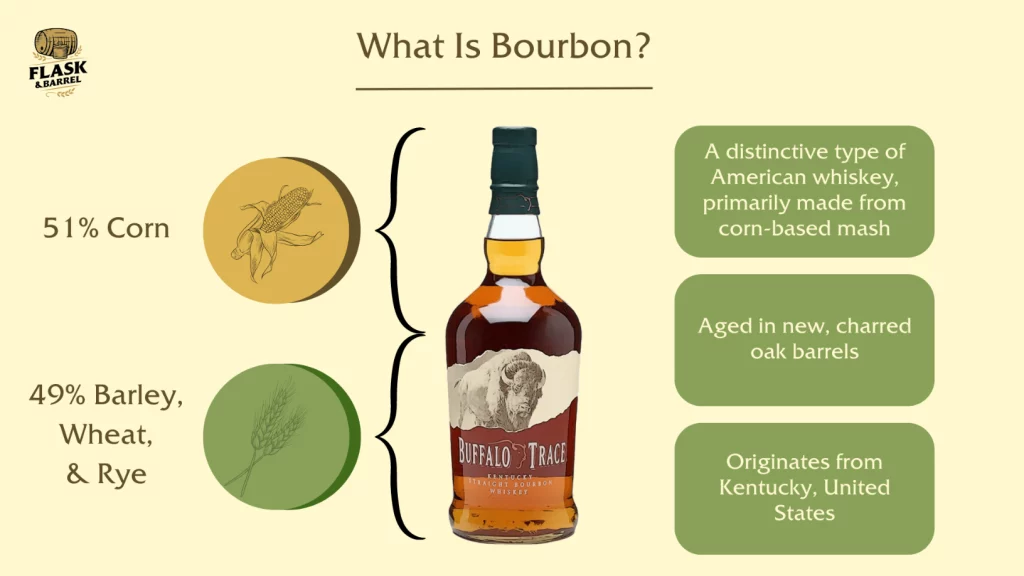
How many calories are in Bourbon?
A standard serving of bourbon, which is 1.5 ounces or approximately 44 milliliters, contains about 97 to 100 calories. These calories come exclusively from the alcohol content, as bourbon is a distilled spirit devoid of carbohydrates, fats, and proteins. The caloric content may vary slightly based on the specific brand and proof of the bourbon, with higher proof (alcohol by volume) bourbons leading to a minor increase in calories. For those mindful of their dietary intake, understanding the caloric impact of bourbon is crucial, highlighting an essential facet of bourbon nutrition facts.
Average calories per serving
The average caloric content in a standard serving of bourbon, which is 1.5 ounces or 44 milliliters, typically ranges between 97 to 100 calories. This calorie count is derived exclusively from the alcohol present in bourbon, as it is devoid of carbohydrates, fats, and proteins.
It’s noteworthy that the specific caloric value can vary slightly based on the bourbon’s alcohol by volume (ABV) percentage, with higher ABV bourbons leading to a modest increase in calories. For those who are conscientious about their calorie consumption, understanding the average calories per serving of bourbon is crucial for integrating this spirit into a health-conscious lifestyle.
To further illustrate how the alcohol content affects caloric intake, consider the following detailed table comparing different proofs of bourbon:
| Bourbon Proof | Alcohol by Volume (ABV) | Estimated Calories per 1.5 oz |
|---|---|---|
| 80 Proof | 40% | 97 |
| 85 Proof | 42.5% | 98 |
| 90 Proof | 45% | 110 |
| 95 Proof | 47.5% | 115 |
| 100 Proof | 50% | 124 |
| 105 Proof | 52.5% | 128 |
| 110 Proof | 55% | 135 |
| 115 Proof | 57.5% | 140 |
| 120 Proof | 60% | 146 |
Are there any vitamins or minerals in bourbon?
Bourbon holds minimal nutritional value concerning vitamins and minerals. The distillation process effectively eliminates most nutrients that the raw ingredients might possess.
Consequently, bourbon contains only trace minerals and has negligible vitamin content. Bourbon’s trace minerals, including sodium, potassium, and magnesium, are present in such minor quantities that they barely contribute to one’s daily nutritional requirements. Hence, while bourbon can be savored for its taste and cultural value, it should not be considered a meaningful source of vitamins or minerals in a balanced diet.
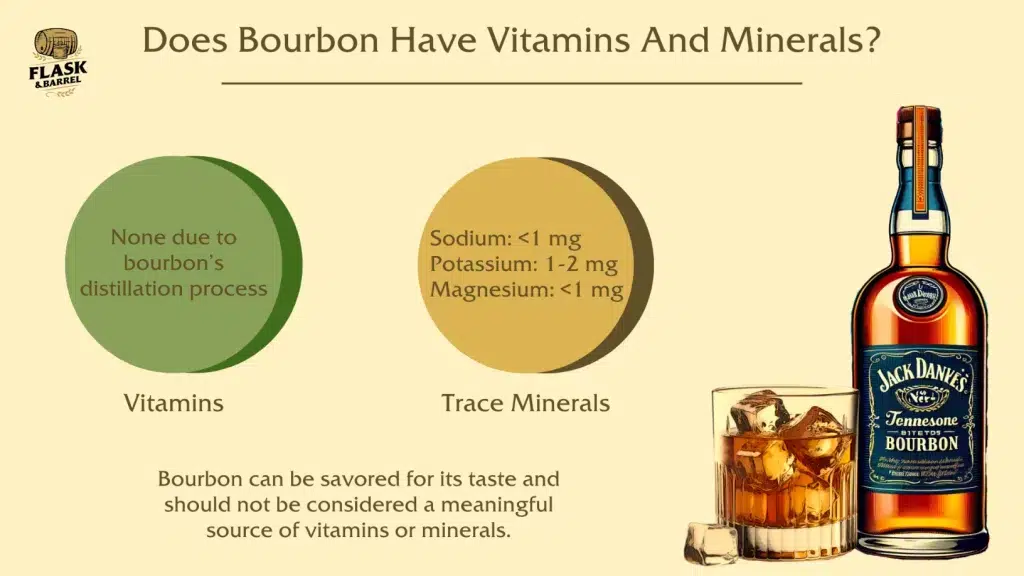
Trace minerals
Bourbon contains trace minerals, a byproduct of its distillation and aging process. Essential minerals such as sodium, potassium, and magnesium do exist in bourbon, but only in minimal amounts. For a clearer understanding, here are the approximate quantities of these minerals in a standard 1.5-ounce serving of bourbon:
- Sodium: Less than 1 mg
- Potassium: 1-2 mg
- Magnesium: Less than 1 mg
These trace quantities are far too small to significantly contribute to the daily recommended intake of these nutrients, rendering bourbon an ineffective source for fulfilling one’s mineral requirements.
Negligible vitamin content
Regarding vitamin content, bourbon offers virtually none. The distillation process, integral to bourbon’s production, strips away most organic compounds, including those that would provide nutritional value. Vitamins such as Vitamin C, Vitamin D, and B-vitamins, which are commonly sought after in diets for their health benefits, are absent in bourbon.
For instance, any vitamins present in the original corn mash are lost during distillation, leaving bourbon devoid of significant vitamin content. Consequently, bourbon cannot be relied upon as a source of vitamins in a diet. Its value lies in its enjoyment and cultural significance, not in health benefits associated with vitamins.
Does Bourbon contain carbohydrates?
Bourbon, as a distilled spirit, is inherently low in carbohydrates. The distillation process transforms the sugars from the corn mash into alcohol, resulting in a beverage that is virtually carb-free. This characteristic makes bourbon a favorable choice for individuals adhering to low-carbohydrate diets, like the keto diet, where it’s crucial to minimize carb intake.
However, it’s noteworthy that flavored bourbons may include added sugars or carbohydrates, altering their nutritional composition. For example, brands like Jim Beam Vanilla and Wild Turkey American Honey offer flavored bourbon varieties that contain added sugars to achieve their sweet profiles. Therefore, while pure bourbon has negligible carbohydrate content, caution should be exercised with flavored variants, as they can significantly differ in carbohydrate content due to added sugars.
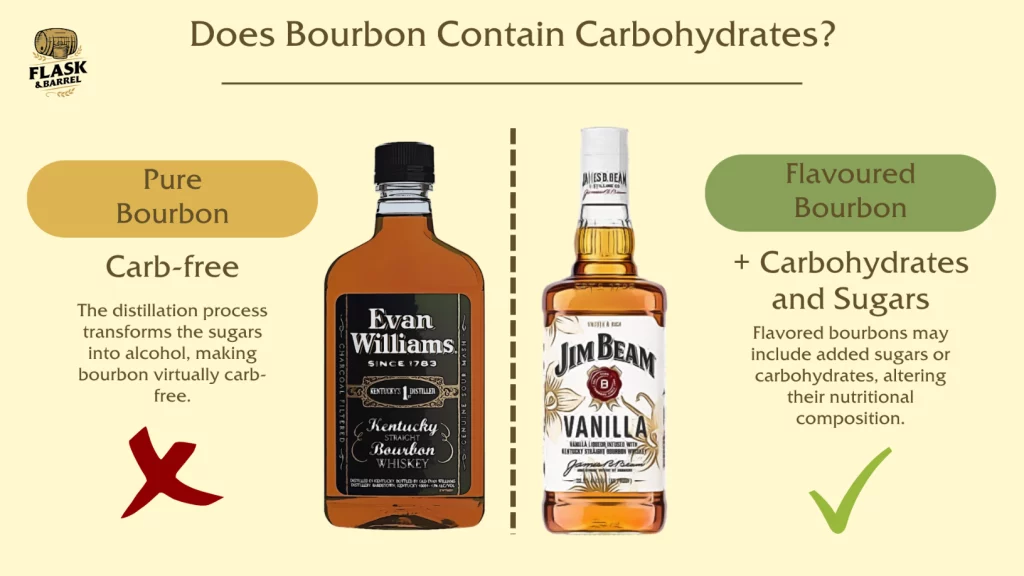
Simple vs. complex carbohydrates
Pure bourbon contains no carbohydrates. Simple carbohydrates, known for their quick absorption and potential to spike blood sugar levels, contrast with complex carbohydrates, which are digested more slowly, offering more sustained energy without drastic blood sugar fluctuations.
Due to the distillation process, which converts the sugars (potential simple carbohydrates) from the corn mash into alcohol, bourbon emerges as a carb-free spirit. However, when considering flavored bourbons, it’s important to recognize that any added sugars would fall into the category of simple carbohydrates due to their quick absorption into the bloodstream.
This characteristic positions bourbon as an appealing option for individuals conscientiously managing their carbohydrate intake, irrespective of their preference between simple or complex carbohydrates, with a special note of caution regarding flavored varieties that may include added sugars.
To illustrate the difference in carbohydrate content between pure and flavored bourbons, consider the following examples:
| Bourbon Variety | Carbohydrates (g) per 1.5 oz Serving |
|---|---|
| Pure Bourbon (e.g., Buffalo Trace) | 0 |
| Jim Beam Vanilla | 8 |
| Wild Turkey American Honey | 11 |
| Maker’s Mark 46 | 0 |
| Knob Creek Smoked Maple | 4 |
What is the alcohol content in Bourbon?
The alcohol by volume (ABV) in bourbon typically spans from 40% to 50%, positioning it on the higher end of the spectrum in terms of alcohol content among distilled spirits. This ABV range is crucial as it significantly impacts the bourbon’s flavor profile, mouthfeel, and the overall drinking experience. According to regulations, bourbon must be distilled to no more than 80% ABV and must enter the aging process in charred oak barrels at no more than 62.5% ABV.
Bourbon’s distillation process and bourbon’s regulatory bodies ensure a consistent quality standard across all bourbon varieties. The aging process not only enriches bourbon with its distinctive taste and aroma but also influences its final alcohol content, rendering each variety of bourbon unique in its essence.
Typical range in percentage
The alcohol by volume (ABV) in bourbon is typically set within a 40% to 50% range. This range is pivotal, as it ensures that bourbon maintains a consistent alcohol content, which is integral to its rich flavor and full body. Legally, bourbon must have a minimum ABV of 40% to be classified as such, a standard that upholds the spirit’s bold character and depth. This specific range is not merely conventional but is rooted in both tradition and regulatory standards, safeguarding the integrity and distinctiveness of bourbon as an esteemed American whiskey.
To provide a clearer understanding of the typical alcohol content range in bourbon, here is a detailed table showcasing popular bourbon brands and their respective ABV percentages:
| Bourbon Brand | ABV (%) |
|---|---|
| Buffalo Trace | 45% |
| Maker’s Mark | 45% |
| Woodford Reserve | 45.2% |
| Bulleit Bourbon | 45% |
| Wild Turkey 101 | 50.5% |
| Knob Creek | 50% |
| Four Roses Single Barrel | 50% |
| Elijah Craig Small Batch | 47% |
| Blanton’s Single Barrel | 46.5% |
| Angel’s Envy | 43.3% |
| Old Forester 1920 Prohibition Style | 57.5% |
| Booker’s Bourbon | 62.5% |
| Pappy Van Winkle’s Family Reserve 15 Year | 53.5% |
How does Bourbon compare to other whiskies?
Bourbon sets itself apart from other whiskies with its unique production process, ingredient composition, and geographical origin. Central to its identity, bourbon must be crafted with at least 51% corn in its mash bill, endowing it with a sweeter flavor compared to whiskies like Scotch or Irish whiskey, which may utilize barley, wheat, or rye. Moreover, bourbon’s aging process in new, charred oak barrels imparts distinctive vanilla, caramel, and toasty wood flavors, a stark contrast to whiskies aged in reused barrels.
The geographical indication further differentiates bourbon, closely tying it to Kentucky, USA, although it can be produced anywhere in the country. This is in contrast to Scotch whisky, necessitating production in Scotland, or Irish whiskey, which originates from Ireland. While the alcohol content in bourbons generally aligns with that of other whiskies, it’s their unique flavor profiles, shaped by specific production standards, that truly distinguish them.
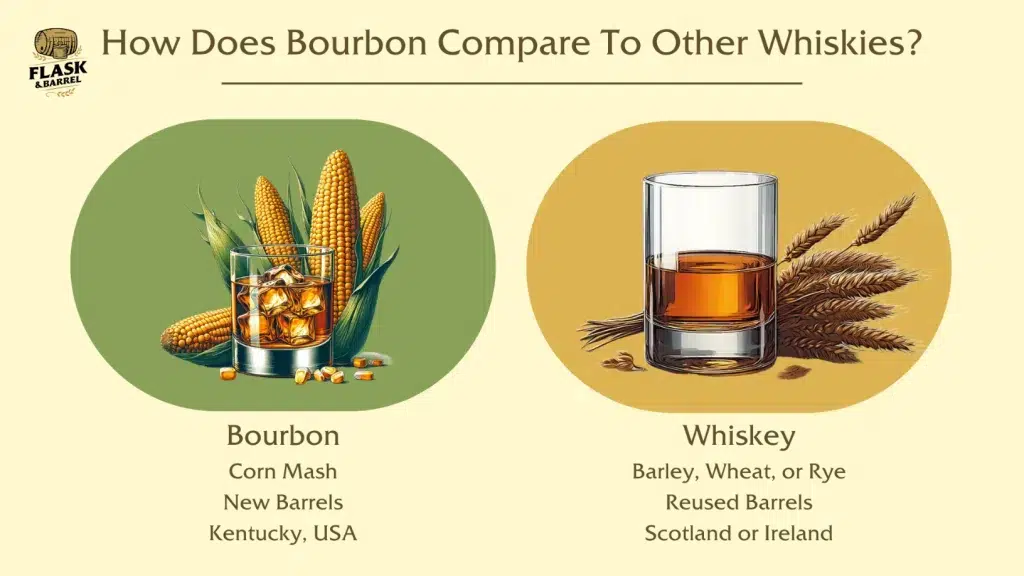
Caloric content comparison
To visually reinforce the similarities and differences in caloric content among different types of whiskey, the following detailed table is provided:
| Type of Whiskey | Average Calories per 1.5 oz Serving |
|---|---|
| Bourbon | 97-100 |
| Scotch | 98-105 |
| Irish Whiskey | 95-100 |
| Rye Whiskey | 96-104 |
| Canadian Whisky | 97-100 |
| Japanese Whisky | 95-100 |
Carbohydrate content comparison
Given the interest in carbohydrate content for those monitoring their intake, especially on low-carbohydrate diets like keto, the following table compares the carbohydrate content of bourbon to other whiskies:
| Type of Whiskey | Carbohydrates (g) per 1.5 oz Serving |
|---|---|
| Bourbon | 0 |
| Scotch | 0 |
| Irish Whiskey | 0 |
| Rye Whiskey | 0 |
| Canadian Whisky | 0-2 (varies by brand and flavoring) |
| Japanese Whisky | 0 |
What are the potential health benefits of bourbon?
Moderate consumption of bourbon may offer certain health advantages, thanks to the antioxidants found in the grains and the oak barrels used in its maturation process. These antioxidants have the potential to neutralize free radicals, possibly reducing the risk of developing chronic diseases.
Bourbon has been associated with a reduced risk of cardiovascular disease, as moderate alcohol intake can lead to an increase in HDL (good) cholesterol levels. The high alcohol content in bourbon can facilitate digestion by stimulating the production of digestive enzymes. It is imperative, however, to underline that these health benefits are likely to be experienced only with moderate consumption, as excessive drinking can result in negative health outcomes.
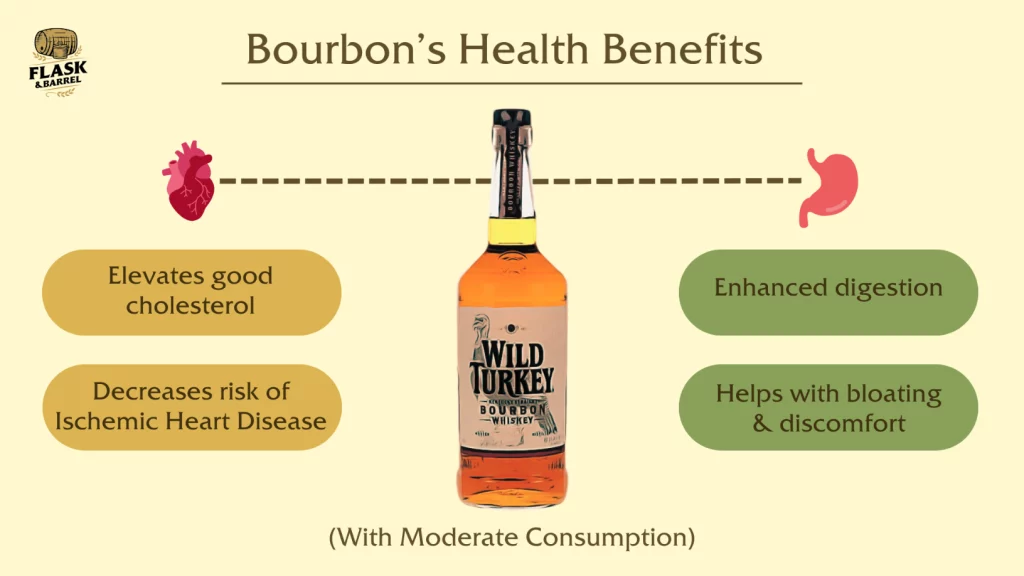
Heart health
Moderate consumption of bourbon has been associated with potential heart health benefits. The presence of ethanol in bourbon can aid in elevating HDL cholesterol levels, commonly known as “good” cholesterol. This increase is crucial for heart protection, as it can help in reducing the risk of heart disease by improving the blood lipid profile and promoting arterial health.
A study published in the Journal of the American College of Cardiology found that moderate alcohol consumption is linked to a lower risk of coronary heart disease, partly due to increased HDL cholesterol levels (Ronksley et al., 2011). Another study in the British Medical Journal supports the notion that moderate alcohol consumption, including bourbon, may reduce the risk of ischemic heart disease (Bell et al., 2017).
Possible reduction in cardiovascular risk
The antioxidants found in bourbon, which originate from both the grains used in its production and its aging process in oak barrels, may play a role in reducing cardiovascular risk. These antioxidants combat oxidative stress, a significant contributor to cardiovascular diseases, by neutralizing harmful free radicals.
A review in the Journal of the American Dietetic Association highlights the potential of phenolic compounds in whiskey to improve the body’s antioxidant capacity, suggesting a possible mechanism by which moderate bourbon consumption could reduce cardiovascular risk (Pandey & Rizvi, 2009).
Digestive benefits
Bourbon may provide notable digestive benefits when enjoyed in moderation. Its high alcohol content is known to stimulate the production of enzymes in the stomach, essential for the efficient breakdown of food. This enzymatic activity can lead to enhanced digestion, offering relief from common digestive discomforts such as bloating and indigestion.
For example, the alcohol in bourbon can increase the secretion of gastric acid, which is necessary for the digestion of proteins and absorption of vitamins and minerals. A study in the Scandinavian Journal of Gastroenterology found that moderate alcohol consumption could increase gastric acid secretion, supporting the idea that bourbon could aid in digestion (Keshavarzian et al., 1990).
Aid in digestion
Expanding on its digestive advantages, the alcohol in bourbon serves as a digestive aid by prompting the stomach to produce more gastric acid. This increase in gastric acid is beneficial for the digestion and absorption of nutrients, positioning moderate bourbon consumption as a beneficial practice for digestive wellness.
The same review by Bode and Bode (2003) in the World Journal of Gastroenterology supports the notion that moderate alcohol intake can enhance digestive function by increasing gastric acid, pepsin secretion, and gastrointestinal motility, further emphasizing bourbon’s potential role in promoting digestive health.
What are the risks associated with consuming bourbon?
While bourbon can offer enjoyment and even certain health benefits when consumed in moderation, it’s crucial to acknowledge the risks associated with its consumption. Alcohol dependency stands out as a primary concern, with vulnerability varying among individuals due to genetic, psychological, and environmental factors.
Excessive consumption can lead to weight gain and metabolic disturbances, as the calories from alcohol are often considered “empty calories,” providing energy but lacking nutritional value. Furthermore, chronic and heavy drinking can severely impact liver health, potentially resulting in conditions such as fatty liver, hepatitis, and cirrhosis.
Additionally, bourbon and other alcoholic beverages can exacerbate issues like acid reflux and diabetes, and may not be compatible with certain dietary regimes, including keto and those aimed at managing gout. It’s also important to consider alcohol’s effect on heart health when consumed in excess, as well as its role in causing hangovers, which can affect one’s overall well-being and daily performance. Embracing moderation and understanding personal limits are essential in minimizing these risks.
Alcohol dependency
Alcohol dependency represents a significant risk with excessive bourbon consumption, characterized by an overwhelming craving for alcohol despite adverse effects on health and well-being.
Risk factors for dependency
The risk factors for alcohol dependency include genetic predisposition, environmental influences, mental health conditions, and patterns of alcohol use. Awareness and early intervention are crucial in addressing these risks.
Caloric intake and weight gain
Excessive intake of bourbon can lead to weight gain due to its “empty calories,” which contribute to a caloric surplus without providing nutritional benefits, complicating weight management efforts.
What is Bourbon’s Impact on Your Metabolism?
The consumption of bourbon can negatively affect metabolism. Alcohol metabolism takes precedence in the liver, disrupting the normal processing of fats and sugars and impacting overall metabolic health.
What is Bourbon’s Impact on Your Liver Health?
Liver health is adversely affected by chronic bourbon consumption, leading to conditions such as fatty liver, alcoholic hepatitis, and eventually cirrhosis, as the liver struggles to metabolize alcohol.
The long-term effects of alcohol on the liver include irreversible damage and significant impairment of liver function, manifesting as cirrhosis, which can have life-threatening consequences.
Can you drink Bourbon with Acid Reflux?
For individuals experiencing acid reflux, consuming bourbon can worsen symptoms by relaxing the lower esophageal sphincter, allowing stomach acids to enter the esophagus more easily.
Can you drink Bourbon with Diabetes?
People with diabetes can consume bourbon in moderation, but it requires careful monitoring to ensure it does not negatively impact blood glucose levels.
Can you drink Bourbon on a diet?
A 1.5oz pour of bourbon contains 97-100 calories. Most diets involve calory counting, which means you can drink bourbon on a diet as long as you’re within your caloric threshold. Bourbon makes activities more difficult, which can impact your weight if you aren’t getting the right amount of activity each day.
Can You Drink Bourbon While on Ketogenic diet?
Bourbon is generally keto-friendly due to its zero carbohydrate content, yet moderation is advised since alcohol metabolism can temporarily halt fat burning, impacting ketosis.
Bourbon and Gout
For those managing gout, bourbon may be preferable to beer or sweet wines but should still be consumed with caution to avoid triggering gout attacks.
Bourbon and Heart Health
Moderate bourbon consumption may be associated with improved heart health by lowering the risk of cardiovascular disease, though excessive drinking can negate these benefits.
Does Bourbon give Hangovers
Bourbon, like all alcoholic beverages, can lead to hangovers. The severity of a hangover varies based on the quantity consumed and individual tolerance levels.





